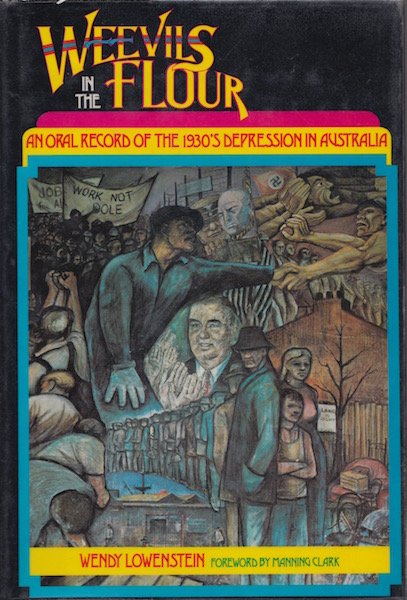‘Who sailed the ship?’ Wendy Lowenstein, Australia’s historian of the worker
History is usually not just “told by the victors”, it’s usually about the deeds of the great and mighty – the Monarchs, Presidents and Generals, rather than the hoi polloi.
Thankfully, some pioneering outliers have upended that paradigm and championed the stories of everyday working people. In Australia, foremost amongst those revolutionaries was historian, folklorist, author, activist and teacher, Wendy Katherin Lowenstein (1927—2006).
Wendy’s ground-breaking interviews and books remind us no-one’s life is all that ordinary, everyone has a story to tell and you can learn as much about a society from talking to its poorest and most humble citizens as to the rich and famous.
Martie Lowenstein / National Library of Australia.
Inspired by groundbreaking US oral historian, author and broadcaster Studs Terkel, Wendy recorded interviews with over 800 everyday people from around Australia about their struggles to obtain better working and living conditions.
With a personal motto of Nix Illigitamus Carborundum (never let the bastards grind you down), it was clear Wendy was not destined for a career as an industrialist!
She attended her first political meeting in 1939, about the Spanish Civil War at the League of Young Democrats, the same year she won a scholarship to Box Hill Grammar School, “run by a principal with Trotskyite leanings who belonged to a Methodist socialist group”.
At 15 she joined her sister Shirley and brother John in Melbourne's New Theatre and the Eureka Youth League where she became deeply involved in radical writing, theatre, art and class politics.
She worked first as a journalist and was for many years a teacher and teacher-librarian. In 1947 she married German-born Werner Lowenstein. They left the Communist Party after the Soviet invasion of Hungary in 1956 but remained committed to socialism and the peace movement.
Lowenstein became interested in folklore after seeing a performance of the play Reedy River in the early 1950s. She helped establish the Folklore Society of Victoria and the Victorian Folk Music Club and from 1964 to 1976 edited their newsletter Gumsuckers Gazette, later renamed Australian Tradition.
In 1969 she and her family spent a year travelling around Australia by caravan on ‘The Australian Folklore Expedition’ collecting songs and stories.
Wendy’s daughter Martie Lowenstein said the Folklore tour was “an incredible year” and her mother’s first step into oral history.
In that year, Wendy recorded 'fascinating, almost unbelievable' stories of outback life, where interviewees lived without cars, medical assistance or television, and entertainment still consisted of 'home-made music, tall stories, poems, and yarns about life'.
Her son, filmmaker Richard Lowenstein said she remained a teacher until a Literature Board grant allowed her to become a full-time writer with works featuring her interviews.
Her first book, Weevils in the Flour (1978), is a memorable record of the 1930s Depression and was the inspiration behind Richard’s award-winning film debut, Evictions.
Richard says that while raising her family, Wendy was involved with the New Theatre, the Eureka Youth League, the Victorian Folk Music Society, the Australian Folklore Expedition, the Boree Log Folk Club, the Colonial Bush Dance Society, Melbourne's Pram Factory Flea Market, alternative and community schools and centres, Friends of the Earth, Arts Action For Peace, the Palm Sunday Committee, the Victorian Secondary Teachers Association and the Oral History Association of Australia!
Asked about the “long and bitter struggle” for worker’s rights, she preferred the description “long and zestful” struggle, insisting it had been “fun” to put oppressors in their place!
Most of Lowenstein’s writings were based on her oral history interviews. Her books remind us that there is no substitute for the authentic voice of workers.
‘Working life fascinates me,’ Wendy told Meanjin in 1987. ‘Historians write as if it all happened without workers! Captain Cook discovered the east coast of Australia, but who sailed the ship?’
The Australian Women’s Register says, ‘Wendy contributed to both social justice and aspects of Australian history which had, until she tackled them, been largely ignored’.
The Wendy Lowenstein Collection consists of over 1200 hours of interviews from over 900 contributors, including children, miners, bosses, wharfies, and outback workers.
Richard said Wendy was “indomitable, single-minded, opinionated and forthright”.
“Over the years she was called many things by many people, including a force of nature, a wonderful original, inspiring, infuriating, combative, impossible, a force to behold. She was even described as like a kid on an adventure.”
He said she was “driven by her belief in the power and importance of the stories of individuals and their direct experiences”.
“She was tireless in her fight against social injustice and gave a voice to the ordinary people who lived history.
“Always an activist, she kept constant watch over the shifting fortunes of the working class. She was passionate about politics, workers' rights and working-class history, and was a fierce campaigner against the capitalist classes, bureaucracies and governments of all persuasions.”
Richard and Martie are now seeking tax deductible donations to turn a 25-minute documentary about Wendy and her close collaborator and friend, dance historian Shirley Andrews into a feature film, Don’t Be Too Polite Girls.
LOWENSTEIN RESOURCES
The Lowenstein Family Collection contains over 900 hours of interviews covering an extraordinary range of subjects, from the Great Depression via progressive arts, miners in Wonthaggi to changes in work in the 1990’s and is available for research purposes.
Find out more about these resources and Wendy Lowenstein’s four published books click here.


